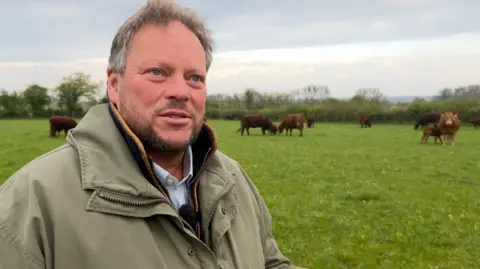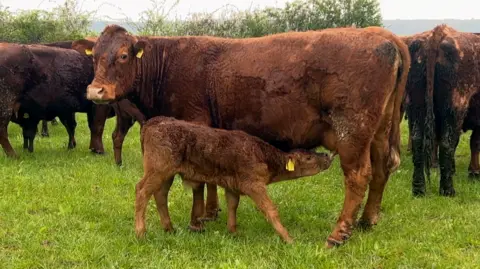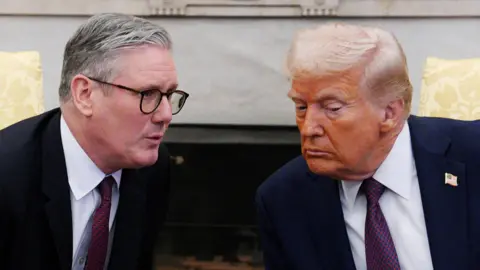'No hormones please, we're British beef farmers'
 BBC
BBCAs talk of a trade deal between America and the UK hots up, farmers on this side of the Atlantic have warned ministers not to dilute British food standards, saying the use of hormones in particular cannot be accepted.
US Vice President JD Vance has said there is a "good chance" of reaching a trade deal with Britain.
But the man who speaks for Britain's livestock farmers insisted any imported US beef must pass the same tests as UK meat.
David Barton, Livestock Chair of the National Farmers' Union (NFU), said: "There is no way we would accept anything that is not produced to our standards".
The last time the two countries tried to agree a deal, negotiations faltered on arguments over food standards.
So why is something as simple as beef so difficult?
David Barton farms several hundred beef cattle on the Cotwolds, north of the ancient Roman city of Cirencester.
When I met him, he was checking on young calves.
"Some of these are just a week old," he smiled.
They will be raised almost entirely on Gloucestershire's green grass and their mother's milk. Mr Barton cuts his own sileage, and buys local cereal feeds for the winter.
He has met American beef farmers, and tells me he has "no issues" with the way they farm.
"They produce beef in a much much harsher environment than we do," he explained.
"Our temperate climate, our lush grass - the British Isles are just designed for beef. We don't have to add much."

Many American farmers use growth hormones as a standard part of their beef production, something that was banned in Britain and the EU in the 1980s.
"In the US that's what they do, and that's fine," said Mr Barton.
"We don't do it here, and that's part of our standards."
He admits that adding growth hormones would make cows put on muscle mass, and so make their beef cheaper, but as a country Britain had "decided we weren't going to do that".
Mr Barton chairs the NFU's livestock group, where he discusses many issues with other beef and lamb farmers.
And he is quite clear that if a new trade deal allowed more US beef into Britain, hormones should be unacceptable.
"What you cannot do is you cannot let imports come in to a lower standard, because you completely destroy what you've built over many years."
 Reuters
ReutersFor now, British ministers insist the country's food and farming rules are "red lines" they will not cross.
Jonathan Reynolds MP, Business and Trade Secretary said: "That's a really important area that we wouldn't be able to negotiate on, and the US understands that."
But could that change, in a close trade negotiation?
President Trump has already championed the "great products" of American farmers and ranchers.
It's known that he wants to see them enjoyed - and sold - across the world. And when family budgets are tight, would at least some British supermarkets be keen to offer cheaper American beef or chicken?
For now, industry experts say no.
Professor David Wain teaches animal welfare at Cirencester's Royal Agricultural University. He told me the "main drivers" in the UK meat industry are retailers, demanding higher standards.
He said: "I'm quite sure that our importation requirements would not permit chlorine washing of chicken.
"And there is no sign at all that the UK would permit hormone-treated beef."
Follow BBC Gloucestershire on Facebook, X and Instagram. Send your story ideas to us on email or via WhatsApp on 0800 313 4630.
